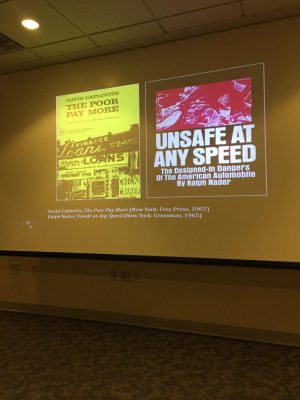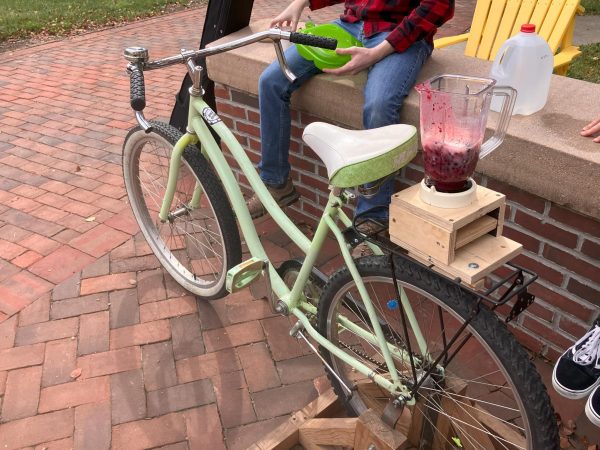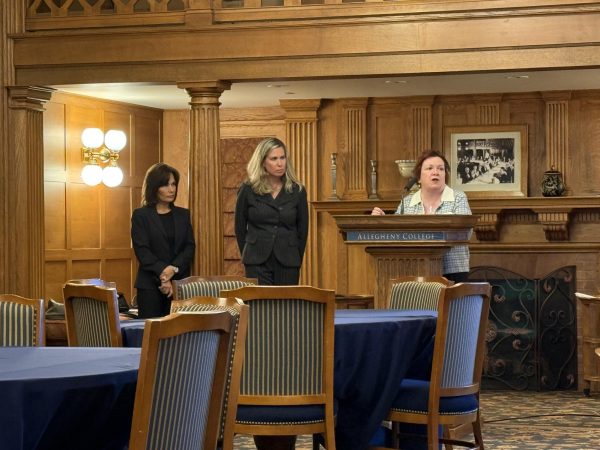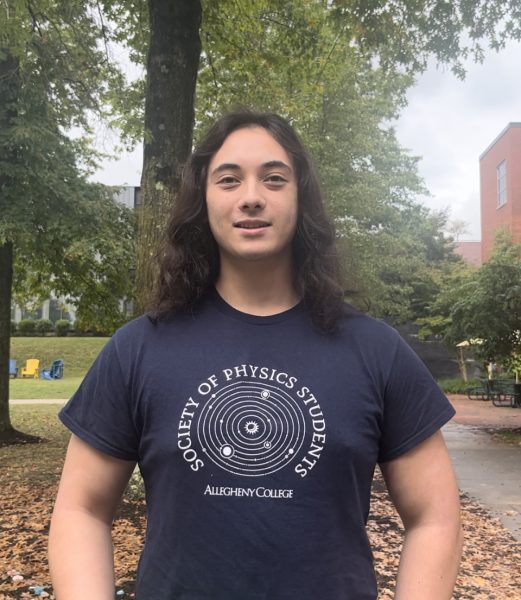Professor gives lecture on minority consumer activism in Philadelphia
Alyssa Ribeiro, assistant professor of history and black studies, delivered a presentation titled “Seller Beware! Black and Latino Consumer Activism in Philadelphia, 1960s to 1980s” on Wednesday, March 7, as part of the faculty lecture series in the Henderson Campus Center.

Slides used during Alyssa Ribeiro’s, assistant professor of history and black studies, presentation “Seller Beware” are shown in the Henderson Campus Center on March 7, 2018.
Ribeiro began the presentation by showing a photograph from the 1970s of a billboard that read, “Philadelphia isn’t as bad as Philadelphians say it is.”
This billboard she described as “tongue in cheek” was a perfect first look at the subject she was speaking on, focusing her presentation on illuminating the struggles that African-American and Puerto Rican communities went through at the hands of shops and businesses that supported racist and classist movements.
“The rise of consumer activism among Spanish speaking populations and continued black participation efforts has been relatively neglected in the scholarship.” Ribeiro said.
Ribeiro’s presentation comes in conjunction with her former class curriculum and book project research.
Ribeiro focused on direct sources for her research and examined event accounts in newspapers ranging from local, civil rights focused ones to official Philadelphia publications.
“North Philadelphia residents rejected the notion that market forces, fiscal austerity, and less government intrusion could adequately solve intrenched urban problems,” Ribeiro said. “Instead, they consistently sought greater intervention. Either through their own direct action, or demands upon the state. In situations like struggles over purchases, housing, and work that occured in their everyday lives.”
Continuing her presentation, Ribeiro said the African-American and Puerto Rican people of Philadelphia’s protests of segregation and intolerance of people of color could be described as “everyday acts of resistance.”
“The actions united black, Puerto Rican and white allies and though these areas faced daunting circumstances, residences achieved strong victories along the way.” Ribeiro said.
While talking about specific groups of resistance within these communities, Ribeiro discussed the actions of The Four Hundred Ministers, which consisted of a large group of religious practitioners who during the week would investigate businesses that encouraged segregation and on Sunday mornings would ask their congregations to not shop there.
“Don’t buy where you can’t work,” is a famous line that the Four Hundred Ministers would use while informing their congregations against different baking companies, soda bottlers, petroleum companies and even newspapers.
In her research Ribeiro found this approach to be very successful because it scared vendors into changing their policies and become more accepting.
Ribeiro focused on another organization in her presentation called CEPA, Consumer Education and Protective Association, that was started by a former realtor, Max Weiner, who quit the business after he saw numerous accounts of these communities of color being taken advantage of. CEPA’s main point was to stress mutual self help among residents.
“They used direct action tactics, such as consumer picketing,” Ribeiro said. “They had countless widely publicized victories at the local level. Such that, in their later years, often a mere phone call from someone involved with CEPA was enough to shake loose some concessions from a merchant. Rather than have to go through the whole production of being picketed and called out in the media.”
Ribeiro discussed Concilo, a group that would assist with disputes when the victim spoke only Spanish, or very little English.
“Language barriers only increased risk of being taken advantage of as a consumer,” Ribeiro said.
This event was attended by students and faculty alike, and audience members were able to make comments or ask questions after the talk ended.
“My junior seminar is with Professor Rebeiro, and I find her class very interesting,” Sherrell Daley, ’19, said. “I actually really want to look at the topic for my comp, which is why I came to this talk.”
Adrienne Krone, assistant professor of philosophy and religious studies, talked about why the presentation appealed to her.
“I will be leading an alternative spring break trip that is going to Philadelphia,” Krone said.
Upon listening to the talk, Krone inquired how Rebeiro chose to study consumer activism in Philadelphia specifically. Ribeiro elaborated that the CEPA organization and their massive success was a subject that drew her to Philadelphia when first looking at the subject.
Rebeiro expanded the series to cover relationships among and between races in specific areas.
“I feel like the relationship between Latino and black communities is really interesting, and the dynamic is very interesting because you can see how it varies throughout decades,” Krone said.





